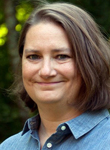Agriculture and climate change meet at new institute
By Amanda Garris

For farmers, a warming climate challenges fundamental decisions they have always made based on the certainty of the weather – such as when to plant various crops, which varieties to choose or what investments in cooling or irrigation infrastructure would make the most economic sense. They will soon have a resource to help them navigate the changes: the Cornell Institute for Climate Change and Agriculture. Allison Morrill Chatrchyan becomes its first director Sept. 1.
“The institute grew out of a very real need to help farmers adapt to the marked changes in our climate that are already underway,” said Mike Hoffmann, director of the Cornell University Agricultural Experiment Station. “Many current agricultural practices are based on long-standing assumptions about temperature and the length of the growing season that are no longer true.”
The institute will act as a clearinghouse for research, climate monitoring, decision‐support tools and applications at the intersection of climate and agriculture. An early step will be developing a website for disseminating and gathering information on farm-level impacts and trends, losses and gains resulting from warming and extreme weather.
Chatrchyan most recently served as environment and energy program leader with Cornell Cooperative Extension (CCE) in Dutchess County and as a member of CCE’s Statewide Energy and Climate Change Team. “Allison has been very active in climate change research and education in the region for many years,” Hoffmann said. “She will be very effective as a point of contact for farmers, researchers and extension educators.”
Two key functions of the institute will be to foster development of decision-making tools to help farmers know when to invest in changes based on science and sound economics, and to establish collaborations to address issues related to climate change and agriculture.
“Working on climate change is my passion. I am most excited about bringing my experience in facilitating groups to work toward achieving a common goal, and in translating science for decision makers,” said Chatrchyan. “This is something that I have done at the national and international level through my work on stratospheric ozone layer protection and climate change, and at the local level in New York state, working with municipal officials, volunteers and farmers at the intersection of land use, agricultural and environmental issues.”
Chatrchyan previously worked for the Bard Center for Environmental Policy, the United Nations Environment Programme and the Law Companies Environmental Policy Center. She received her Ph.D. in environmental and comparative politics from the University of Maryland, College Park – a social science background she sees as an important starting point.
“I think it’s critical that we understand more fully what farmers know about climate change, the effect that climate change is already having on their operations, and whether or not they are making changes to reduce their impact and adapt to climate change,” she said. “This is really important, because if we don’t know what farmers believe or need, then we can’t design decision tools that will help them.”
The institute, which is supported by USDA federal capacity funds, will leverage climate change expertise across the Cornell campus.
“Cornell has depth and breadth across a multitude of disciplines involved in climate change and agriculture, including crop and soil science, pest management, earth and atmospheric sciences, plant breeding and genetics, and the Atkinson Center for a Sustainable Future,” said Kathryn Boor, the Ronald P. Lynch Dean of the College of Agriculture and Life Sciences. “Strategic decisions backed by sound science will pay off in the long term for New York farmers.”
Amanda Garris, Ph.D. ’04, is the experiment stations communications officer for the College of Agriculture and Life Science.
Media Contact
Get Cornell news delivered right to your inbox.
Subscribe